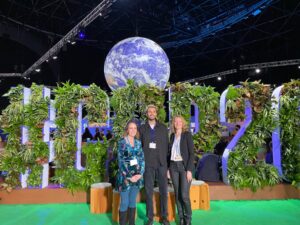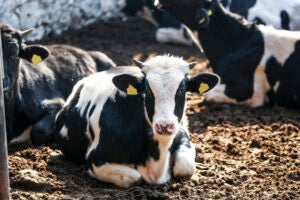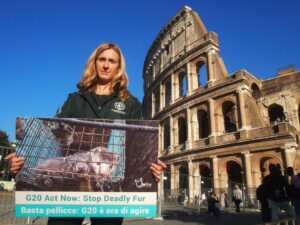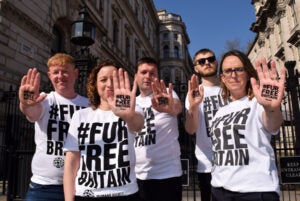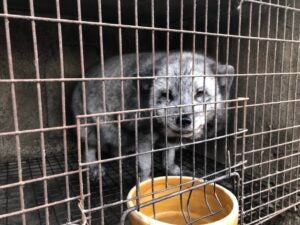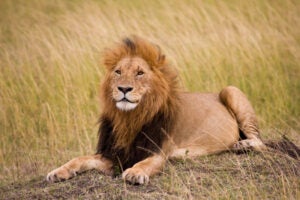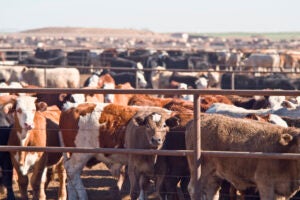
LONDON—As COP26 prepares to reveal the final pledges focused on cutting emissions from energy, transport and other sectors, campaigners from Humane Society International, one of the largest global animal protection NGOs in the world, say the total omission of targets to reduce livestock farming and cut meat and dairy production and consumption, represents a ludicrous failure considering the sector is the world’s second largest emitter of human-induced greenhouse gases.
Stefanie McNerney, plant based solutions manager at Humane Society International, says: “Whilst there were many conversations at COP26 side events and press conferences about the urgent need for global food system reform to cut meat and dairy production and consumption, this vital climate mitigation strategy was depressingly absent from the COP26 leader negotiations. Current pledges on methane, coal, forests and transport still look set to put us way off target to limit global temperature rise, so it is a ludicrous failure to ignore the opportunity to limit one of the biggest greenhouse gas emitters in the world, animal agriculture. We need policies and targets that shift farming toward plant-based food production, and the clear lack of ambition to do so is deeply troubling. We have reached a stage in the climate crisis where so called technical solutions such as cattle feed additives are nowhere near enough to tackle emissions from this sector. The climate clock is ticking and it is well past time to move beyond these low-impact greenwashing distractions offered by Big Ag that merely perpetuate the growth of an unsustainable industry. The science is clear that that’s not an option. Will governments follow the science and plan a just transition to a more climate-resilient, plant-centric food system, or will we be waiting until the cows come home for them to stop ignoring the cow in the room?”
Key points:
- Despite world leaders at COP26 acknowledging that food production not only contributes to climate change, but also holds one of the keys to mitigating it, dialogues around this sector lacked ambition, with most official conversations focusing on low-impact strategies such as modifying livestock feed, tackling nitrous oxide in fertilizer and rewilding, whilst completely omitting discussion of high impact actions such as livestock reduction and diet change.
- HSI welcomes the pledges on methane reductions and bringing an end to deforestation. However, animal agriculture is one of the largest contributors to both methane emissions and deforestation, and these issues cannot be addressed without reducing global livestock numbers and shifting to more plant-centric food production and consumption.
- Diverting the discussion toward short-sighted mitigation tactics whilst willfully ignoring and even shooting down the topic of livestock reduction and diet change is nothing short of greenwashing by the livestock industry. Governments that are serious about climate change must address emissions from animal agriculture, and that means reducing the number of animals raised for consumption and transforming our food system to a more sustainable, resilient, plant-centric system that is just for all.
- On the subject of missing the point, in the draft CMA decision by the COP26 president, the words ‘animal agriculture’ and ‘farming’, let alone ‘livestock reduction’ do not even feature once.
- The other cow in the room was the cow served on the COP plates. The provision of meat on the menu at a climate conference was disappointing. The CO2equivalent labelling on all food served at the conference clearly demonstrated the very large carbon footprint of beef dishes compared to plant-based options. The juxtaposition of emissions between a beef burger weighing in at a hefty 3.3 kg CO2 e compared to a plant-based burger at just 0.2 kg CO2 e literally served up an obvious mitigation strategy on a plate—one that was a glaring omission from the COP26 negotiations.
HSI’s #TheCowInTheRoom campaign called on COP26 to acknowledge and act on the climate damaging impacts of intensive animal agriculture. The campaign has the backing of leading plant-based food companies and investors including Beyond Investing, Mosa Meat, Eat Just, Wicked Kitchen and Linda McCartney Foods, as well as celebrities such as Moby, Billie Eilish, Joaquin Phoenix, Alan Cumming, Alicia Silverstone, Mary McCartney, Leona Lewis, Martin Freeman, Lily Cole and Stephen Fry. Earlier this week the campaigners handed in a petition of more than 70,000 signatures with campaign partners ProVeg International and Four Paws.
ENDS
Media Contact: Wendy Higgins: whiggins@hsi.org

